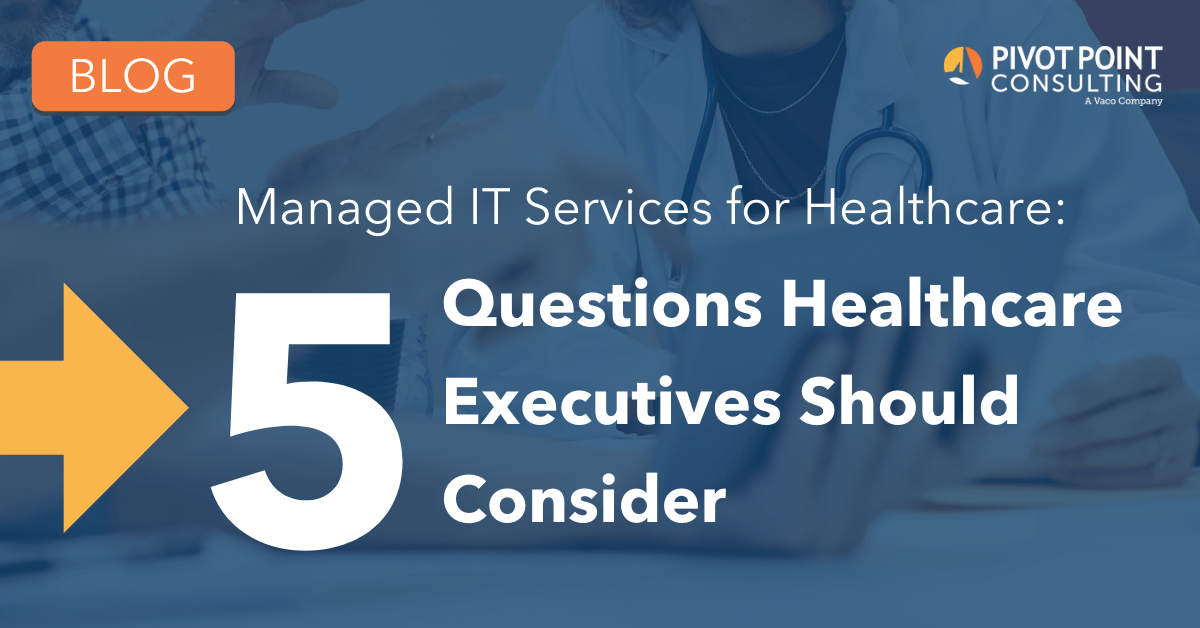Historic shifts in the labor market during and coming out of COVID-19 have redefined how industries identify and retain resources to achieve their strategic goals. Healthcare organizations have seen significant disruption to their staffing models, especially in their IT divisions. This has left many healthcare organizations looking for ways to get the most of their highly specialized staff, which is why many are turning toward managed IT services as a scalable resource.
When healthcare organizations outsource portions of their IT to a Managed Service Provider (MSP), they free staff from managing day-to-day tasks, allowing them to work to their full potential. Outsourcing Service Desk or Application Management becomes strategically important because it enables healthcare organizations to focus on high-value projects and initiatives.
Healthcare executives constantly balance budgets, priorities and how to deliver on organizational goals. A significant consideration in every endeavor is “who do I have to do the work?” Often, that answer is ambiguous, unknown, or, even worse, the same resource for different projects.
Looking to a managed services solution can help lift much of the day-to-day burden from your staff.
Below are the answers to 5 questions healthcare executives should ask when looking to leverage a managed IT services partner.
1. What are IT managed services for health systems?
Healthcare organizations support a multitude of areas – patients, users, EHRs, clinical systems and many others. Managed Services in the health care IT space also support multiple areas – IT Service Desk, patient portal support, as well as EHR and clinical system application support. A high-quality MSP will have specialized staff supporting each of those areas.
2. What is included in IT managed services for healthcare organizations?
Managed services for healthcare organizations come in many forms. Health systems may choose to outsource high volume, low complexity tasks such as device support, password resets or general system access. Others may turn to an MSP for more complex systems and applications support such as EHR management, system upgrades, data centers and break fixes.
Supported applications may go beyond the electronic health record to include payroll, time management software, Microsoft Office and much more. Many health systems outsource both the “keep the lights on” work and the complex application management as part of a more comprehensive approach to achieve greater scale.
3. Why might I want to pursue a managed services solution?
Healthcare organizations experienced a significant impact in the labor shifts of 2020 and 2021. As discussed in the 2022 Healthcare IT Directions Report, 1 in 5 healthcare workers has quit their jobs since February 2020. A diminished labor force combined with a move to more remote work opportunities makes it difficult for smaller organizations to hire and retain staff.
Managed IT services for hospitals removes the many operational and financial burdens associated with employee turnover. A healthcare IT consulting partner provides experienced and reliable consultants to free up core IT staff to get back to what they were hired to do. This can act as a “force multiplier” for IT departments by transitioning necessary, yet critical, functions to their MSP partner. For example, Pivot Point Consulting’s application support offerings include:
- Application management/monitoring
- Upgrades
- Reporting
- Security
- Testing
4. How can a managed services solution improve operational outcomes?
Managed services provides scalability. Many health systems’ support models reside in various functional areas and may or may not integrate well together. Leveraging a managed services partner like Pivot Point Consulting can help redirect your highly specialized staff to critical projects. Many health systems are restricted to only hiring within their local markets.
An MSP can find staff nationally and broaden the pool of talent within an organization, often at a lower net cost. Additionally, a managed services solution helps solve situations where incremental or partial resources are needed, but don’t support a full-time employee allocation. This scalability allows for cost savings and greater efficiency in outcomes.
5. How can healthcare executives choose the right healthcare IT MSP?
Performing due diligence is key. Consider the following questions:
- What is the MSP’s experience with the applications you are asking them to support?
- How will the MSP promote efficiency, cost savings and cost-effective outcomes either through its methodology or by using automation to eliminate manual tasks?
- What are the service level agreements (SLA) that the health IT MSP must adhere to? Distinguish between routine maintenance, upgrades vs. updates and applications not working as intended vs. new requests. This may require improvements to the ticket entry and capture process. Can the MSP assist with this?
- How can the MSP integrate into the larger strategic vision of the organization?
- Can the healthcare IT MSP assist with labor management by redeploying or upskilling current staff?
Free yourself up to focus on strategy.
As healthcare organizations continue to implement increasingly complex health IT, many executives are concluding that they need help. Most health systems do not have the internal resources to maintain existing applications while pursuing new opportunities that improve patient care and care delivery.
Managed services for healthcare IT has never been more important than it is today. With the help of a reputable managed services partner like Pivot Point Consulting, healthcare organizations can improve outcomes while gaining operational efficiencies and providing cost-effective care.


